- Home
- Anne Bennett
Keep the Home Fires Burning Page 2
Keep the Home Fires Burning Read online
Page 2
Marion hoped that war talk wouldn’t dominate the tea table but, surprisingly, it was her father who said in a break in the conversation, ‘They’ve recalled the Territorial Army from overseas. A bloke at work told me that his son was in France and had to come home.’
‘You never told me this,’ Clara complained.
‘I’m telling you now, aren’t I?’ Eddie said mildly. ‘Tell you summat else as well. They’ve begun a call up of men aged twenty and twenty-one.’
‘Christ! That’s it then.’
‘Good,’ Richard said. He looked at his parents as he went on, ‘What you told us this morning about The Night of Broken Glass made me feel sick. It’s hard to believe that people could be so cruel and heartless, and Hitler’s long been picking on the Jews. One of the Jewish apprentices told me that they hadn’t been able to go to school for ages before they came here.’
‘That would suit Tony then,’ Bill said.
‘Don’t think much of what they tell me would suit anyone, Dad,’ Richard said. ‘You wouldn’t credit some of the things they say happen. I thought that maybe they were exaggerating a bit. Now I’m pretty certain they’re not. They had to leave their parents behind and haven’t heard a word from them since.’
Clara had been astounded at Richard speaking so forcibly, but she recovered herself enough to say, ‘We are talking about Jews. They are little better than heathens ? and don’t forget they killed Jesus Christ.’
‘Not these particular Jews,’ Richard said with a pitying glance at his grandmother. ‘That happened nearly two thousand years ago, and they worship the same God as you. But, just as important as all that, they are people, the same as us, who feel the same hurt and pain. Someone must stop Hitler.’
‘It very much looks as if we’re getting ready to do just that,’ Bill said.
His words hung in the air and there was nothing anyone could say for a minute or two, the atmosphere was so highly charged.
In the end Marion said, ‘If we have finished shall we go into the other room and let the children sit down? I’m sure they’re more than ready for it, and we can have another cup of tea in there if you’d like one.’
Clara got up from the table, grumbling about being shooed away before she was ready, and glared so malevolently at the twins that Magda said afterwards it was as if she was begrudging them every mouthful.
Tony came sidling in as the adults were leaving the room. Magda could never understand how he timed it that well. She was so mad at the unfairness of it all and her brother’s smugness that she gave him a hefty kick under the table with her stout shoes and heard his yelp of pain. She thought it worth the reprimand because it managed to wipe the smirk off his face for once.
Despite the lovely food they had on Sunday, Magda often felt that it was the very worst day of the week, not only because of her grandmother’s visit, but also because of the clothes she had to wear for Mass. Marion often despaired of getting Magda to behave in a more ladylike way and the difference between the twins was more marked on Sunday, when they dressed in their best clothes, than on school days when they wore more serviceable clothes in navy or grey. Today they wore matching lace-trimmed dresses decorated with swirly patterns in pastel colours, with lace peeping out from the hem, and Magda knew that when they undressed for bed that night, Missie’s would be little different from when she had first put it on, while her own would resembled a limp rag.
‘It’s just as if, as soon as she’s dressed in her good clothes, muck in all its various forms flings itself onto her,’ Marion said to Bill later that same evening after the twins had gone to bed. ‘And she is so clumsy on Sundays. She seems to drop or spill nearly everything given to her and so that ends up on her dress as well. My mother always has something to say.’
‘Huh,’ Bill said. ‘That’s no surprise. She never has a good word to say about Magda anyway.’
‘She does seem to have it in for her all right,’ Marion conceded.
‘And have you thought that Magda might soil her clothes more because she is trying too hard? Her nervousness makes her more clumsy, especially with your mother around.’
‘I never thought of it like that before.’
‘Well, I’ve just been up to them,’ Bill said, ‘and their dresses are hung on the chair by the bed, so how about saying nothing more to Magda tonight, especially as your mother gave her a real roasting about the state of her clothes already?’
Marion knew that Bill had a point, so when she went to say good night to the girls she took the dresses without a word, though she knew she would have her work cut out getting Magda’s dress respectable enough to wear the following week. Magda, expecting some reprimand, was surprised when none came.
‘Have you both said your prayers?’ their mother asked, and the twins nodded solemnly.
‘We said them with Daddy,’ Missie said.
‘Well now, don’t you be talking half the night either,’ Marion said as she tucked them both in, gave them each a kiss and turned out the light but left the landing one on so that there would be a dim light for Sarah to get undressed by. ‘Remember you have school in the morning.’
Magda couldn’t believe she had got away so lightly and neither could Missie. ‘Maybe it was because Grandma told you off so much?’ Missie suggested.
‘Shouldn’t think so,’ Magda said. ‘She has told me off lots of times. Maybe Mommy just thinks I’m a hopeless case.’
‘Well, Grandma might too eventually.’
‘She won’t,’ Magda said. ‘I heard Daddy say that she’ll still be giving out when they nail her coffin down.’
Missie giggled.
‘I don’t think I was supposed to hear,’ Magda said, ‘but he really doesn’t like Grandma any more than we do.’
‘Does anyone?’ Missie answered. ‘Cept Granddad and Mommy, I suppose.’
‘Well, I don’t blame anyone for not liking her,’ Magda said.
‘Nor me,’ Missie agreed, and the two girls fell to discussing just how horrid their grandma was, so that when Sarah came to bed the two girls were wide awake.
‘You two should be asleep by now,’ she chided.
‘We were talking about Grandma Murray,’ Magda explained. ‘I think she’s a witch. She looks like a witch. Everything is long and pointed, like her bony fingers and her nose, and she’s got no proper teeth, just brown stumps.’
‘And she always wears black as well,’ Missie put in.
‘That’s because she lost all the babies and that,’ Sarah said as she took the grips out of the bun holding her hair in place. Her hair cascaded down her back and she brushed it out with the big wide brush. ‘Mom told me and Richard ages ago.’
‘Tell us then.’
‘It’s time for you to go to sleep.’
‘Oh, go on, Sarah,’ said both girls together.
‘All right,’ Sarah said, winding her hair into one plait with a speed that the twins always envied. She secured her hair with a band and padded across the room, saying as she did so, ‘But budge over then. I need to get into bed first.’
The twins moved across to make room for their sister and she turned off the light and got into bed between them. With the three of them all tucked in together and the darkness settling around them, Sarah said, ‘Mom said Grandma Murray had ten children altogether and one by one most of them died.’
‘What of?’
‘Some from diphtheria, Mom said, and others from TB.’
‘And was they all babies?’
‘No,’ Sarah said. ‘Mom said they were mostly children, only there was a baby who died in her cot when she was only little and they never found out why. Anyroad, in the end, there was only four left, Mom, Aunt Polly and the two eldest, Michael and Owen. Then Owen and Michael decided to try their luck in America, only Michael didn’t make it and when Owen wrote and told them of his death Grandma Murray pledged that she would wear black until the day she died. Mom always said that his death had affected her most, for he had been her fi
rst-born and the seventh child of hers to die, and then his body had been tipped into the Atlantic so she didn’t even have a grave to visit.’ Sarah let the twins reflect on this for a moment or two and then she said, ‘Now you’ve got to admit that that’s really sad.’
‘It is,’ Missie agreed slowly and then added, ‘And with anyone else I would feel very sorry for them, but Grandma’s hard to feel sorry for, and she can be so nasty at times.’
‘Mom always says that we have to make allowances,’ Sarah said. ‘Point is, though, I don’t see how shouting and going on like she does can help anyone cope better.’
‘Nor me,’ Magda said. ‘And I still don’t like her much.’
Missie shivered. ‘Nor me, and she scares me as well.’
‘She don’t scare me,’ Magda declared stoutly. ‘I won’t let her scare me.’ But she said it as though she were trying to convince herself.
‘Well, whatever you think about her, let’s stop talking about her now and go to sleep,’ Sarah advised. ‘Or Mom will be up to see what we are gassing about, and I’m bushed and don’t want to talk any more.’
Neither did Magda, who was suddenly feeling very sleepy, and beside her she heard Missie give a yawn and the three girls snuggled down together and were soon all fast asleep.
TWO
Afterwards, Marion thought it was from that weekend that the mood of the country changed subtly, as most people realised that the war no one really wanted was moving closer. Bill told her of the shadow factories springing up alongside legitimate ones, making military equipment and vehicles. In Birmingham the gun trade was booming. These sorts of things weren’t reported but, as Bill said, you can’t stop people talking, and word got around.
‘Personally I find it reassuring,’ he said. ‘If we do eventually go to war, then I’d like to know that the Government has been making plans for it.’
Only a week or so later Marion’s sister, Polly, popped round to announce that her two elder boys, Chris and Colm, had got jobs in Ansell’s Brewery on nearby Lichfield Road, taking the place of two boys just a little older, who had been conscripted. Polly’s sons were sixteen and fifteen, and had not had jobs since leaving school. Marion was glad that the lads were working at last and hoped that would make life easier for her sister.
Polly was married to Pat Reilly, who was a wastrel. If he had got work of any kind and looked after her sister properly, Marion might have forgiven him for taking her down when she was only sixteen, but he hadn’t done that. Polly’s house was little more than a stone’s throw from Marion’s, yet it was part of a warren of teeming back-to-back houses and as different from where Marion lived as it was possible to be.
When Polly had married Pat they had had nowhere to live but with Pat’s riotous family, but a little after Chris’s birth, a scant three months after the hasty marriage, they had acquired the house. Marion thought it little more than a slum. Entries ran down at intervals from the street to a squalid back yard, onto which Polly’s house and five others opened directly. The yard, usually crisscrossed with washing lines, housed the brew house where all the women did their washing, the tap outside it however, which froze every winter, had been the family’s only source of water until it had been piped into the houses just a few years before. Even now, Polly shared with two other families a miskin, where the ash was deposited, a dustbin, and a lavatory, which was situated at the bottom of the yard.
The house itself consisted of a scullery, which was little more than a cubbyhole at the top of the cellar steps, a small living room, a bedroom and an attic. Attached to Polly’s house was one just the same, which opened onto the street. There was a smell about the whole place: the smell of human beings packed tightly together, the stink of poverty and deprivation mingled with the vinegary tang from HP Sauce halfway up Tower Hill just behind them, and the yeasty malty odour from Ansell’s Brewery on the Lichfield Road, and you heard the constant thud of the hefty hammers from the nearby drop forge.
Marion blamed Pat for not working harder to get a job so that he could lift the family into something better. She thought Polly was far too easy on him and that she should tell him straight to steer clear of the pubs until he found employment. Polly, however, claimed he did try to get work but all the jobs he could get were casual or temporary, and that a man had to have a drink now and then.
So now Marion said to her sister, ‘No chance of Pat getting set on there, then?’
‘He did ask,’ Polly said, ‘but it was young fellows they were after. Anyroad, I don’t think it would do Pat any good to be working at a brewery. He might be tempted to taste the wares.’
‘He’d not reign there very long if he did that.’
‘He did ask the lads if they ever got any free samples.’
Marion wasn’t surprised at that. ‘He would.’
‘Anyroad,’ Polly said with a grin, ‘while they don’t actually give free samples, each worker gets a docket for two pints of beer a night. Colm and Chris won’t yet, of course, because neither of them is eighteen. Chris said when he is, he will give his dad his allowance, but I said he might be in the army when he’s eighteen so Pat may have to do without his beer.’
‘Yes,’ Marion said. ‘Worrying times, these, to have boys the age they are. I tried to get our Richard interested in the joining the Territorials. They’re looking for recruits and they might have taken him next year when he’s sixteen. Thought it might keep him out of the regular army for a bit, but he wouldn’t hear of it. He said until he is old enough to enlist he’ll do his bit in the brass foundry.’
‘My lads are the same,’ Polly said. ‘They said that Ansell’s will do till they are eighteen and then they both want to join the Royal Warwickshires. The brass foundry is probably making summat for this bloody war everyone is certain sure is coming our way, anyroad. Pat says a lot of firms are doing that now.’
‘It is. Richard said they’re getting new machines in soon, and new dies fitted to the old ones, and all work then will be war related.’
‘All this talk of war is scary,’ Polly said. ‘Pat seems to think that it’s inevitable.’
‘So does Bill.’
‘Makes you wonder where we’ll all be in a year’s time.’
‘Maybe it’s a good job we can’t see into the future.’
‘I suppose,’ Polly mused. ‘Funny how life turns out. You always seem to fall on your feet, though.’
‘That’s not really fair,’ Marion said. ‘A lot of my good fortune is because I married Bill and he has a good job.’
‘Yeah,’ said Polly. ‘And you kept your legs together till the ring was on your finger, though if I hadn’t been expecting, Mammy and Daddy would never have agreed to me marrying one of the Reillys.’
‘Maybe not,’ Marion said. ‘But that’s not really any excuse for … Look, Polly, when I spotted you staggering down the gravel drive carrying the bass bag you had taken with you into service that afternoon in June 1923, the blood ran like ice in my veins.’ She still carried that mental image with her. Her sister had always had more meat on her bones than she had, and her hair veered more towards blonde than brown, but apart from that they were very similar and both were pretty girls. Polly had just a dusting of pink on her cheekbones, a cluster of freckles below her eyes. That day, though, her face had been bright red and swollen with the tears she had shed and her hair falling over the face, and even her straw bonnet had been askew.
Polly nodded. ‘You knew what it was all about then, didn’t you?’
‘Course I did,’ Marion said. ‘That’s about the only reason that anyone is dismissed from service. Tell you, I was almighty glad that promotion to lady’s maid meant I had a room of my own and I could grab you before you alerted the house, and hide you away in there.’
‘You nearly shook the head from my shoulders.’
‘Can you wonder at it, Poll?’ Marion demanded. ‘I wanted you to say that you weren’t in the family way. I would have been so pleased that day to have been proved
wrong.’
‘I never remember feeling so miserable,’ Polly said. ‘And you went wild when you knew who it was I’d lain with. And he didn’t take me down, not really. I mean, he didn’t make me or anything.’
‘Be quiet, Polly,’ Marion said, genuinely shocked. ‘Have you no shame? Don’t talk in that disgusting way. Did you at no time think of the consequences and that your disgrace and shame would taint the whole family?’
‘No,’ Polly said. ‘Not then I didn’t. I loved Pat, see. I wasn’t really a bad girl.’
Marion knew she wasn’t. Polly didn’t have a nasty bone in her body, but she had been very gullible then, and anxious to please when she was younger, and, Marion had to admit, hadn’t changed much. Polly had always wanted to be liked and probably still did.
There was only one answer, one way out of this terrible dilemma. ‘Well, Pat Reilly will have to be made to marry you, that’s all,’ Marion had said, but even as the words were out of her mouth she knew what Polly’s life would like, married to such a man. She doubted she’d ever have a penny piece to bless herself with and a houseful of babies before she was able to turn around.
‘I never minded marrying Pat,’ Polly said, and added a little defiantly, ‘and he didn’t have to be forced either. Despite everything, I still don’t regret that marriage. I was really glad that Lady Amelia gave you leave to go home with me and tell Mammy and Daddy,’ Polly added fervently. ‘I think Mammy might have killed me stone dead that day if you hadn’t been there.’
‘In all honesty I was little use to you,’ Marion admitted, ‘because when Mammy started laying into you and screaming vile and obscene words I never thought I would hear her say, I was too shocked to move. It was Daddy coming in from work that really saved you that day, though he too was shaken to the core at what you had done.’

 As Time Goes By
As Time Goes By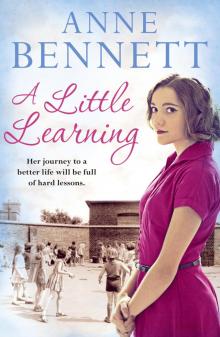 A Little Learning
A Little Learning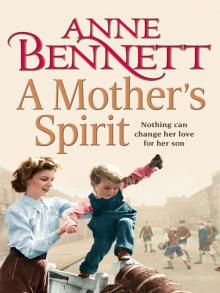 A Mother's Spirit
A Mother's Spirit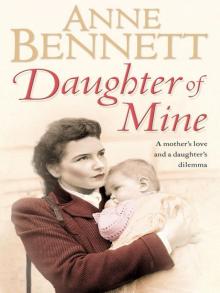 Daughter of Mine
Daughter of Mine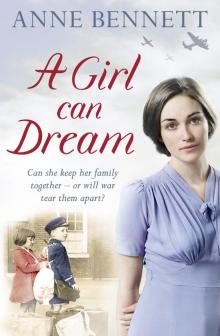 A Girl Can Dream
A Girl Can Dream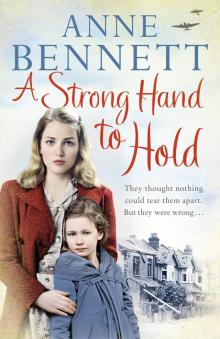 A Strong Hand to Hold
A Strong Hand to Hold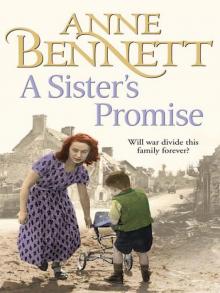 A Sister's Promise
A Sister's Promise To Have and to Hold
To Have and to Hold Pack Up Your Troubles
Pack Up Your Troubles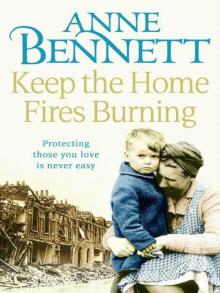 Keep the Home Fires Burning
Keep the Home Fires Burning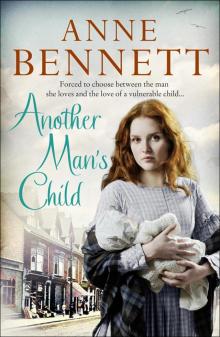 Another Man's Child
Another Man's Child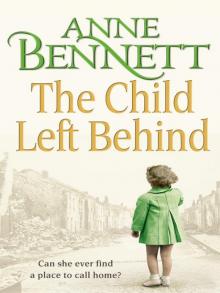 The Child Left Behind
The Child Left Behind Mother’s Only Child
Mother’s Only Child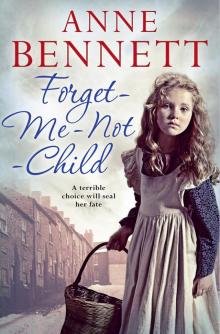 Forget-Me-Not Child
Forget-Me-Not Child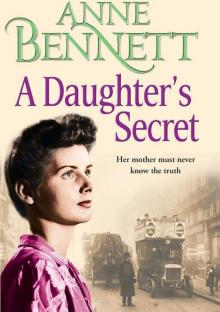 A Daughter's Secret
A Daughter's Secret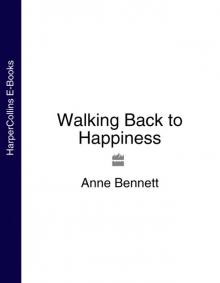 Walking Back to Happiness
Walking Back to Happiness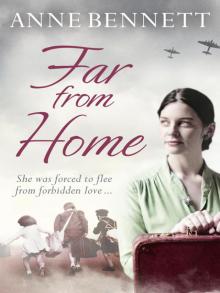 Far From Home
Far From Home Till the Sun Shines Through
Till the Sun Shines Through